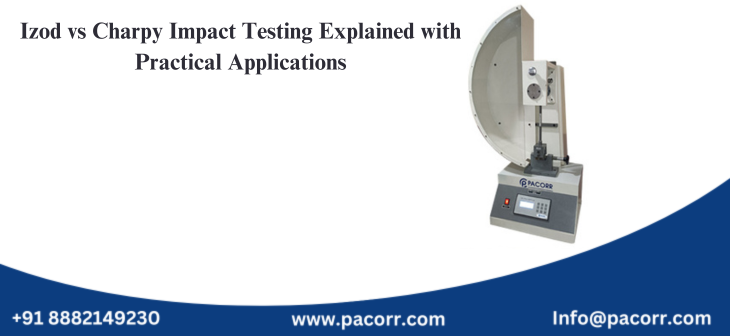
Every industry, from automotive to aerospace, relies on the durability and safety of materials. Impact testing is one of the most critical processes for evaluating how well a material can withstand sudden force or shock. Instruments like the Izod impact tester and the Charpy impact tester are indispensable tools for determining a material’s toughness and impact resistance. This guide explores the significance of impact testing, provides insight into various testing methods, and highlights how standards like ASTM D256 and ISO 179 ensure reliability and consistency.
What Is Impact Testing?
Impact testing evaluates a material's ability to absorb energy and resist failure when subjected to a sudden blow or force. It simulates real-world conditions such as collisions or drops to determine how a material reacts under stress. The results help manufacturers identify potential weaknesses and improve product safety and performance.
For instance:
- In the automotive industry, impact testing ensures that parts like bumpers and frames can absorb collision forces effectively.
- In packaging, it verifies whether plastics used for containers and films can protect products during shipping.
- In construction, it assesses the strength and safety of materials used for structural support.
By understanding a material's impact resistance, industries can design products that are safer, more reliable, and compliant with global standards.
The Izod Impact Tester: A Key Instrument for Toughness Testing
The Izod impact tester is a reliable tool for measuring the toughness of materials, particularly thermoplastics and metals. In this method, the material is clamped vertically, with a notch facing the pendulum. The pendulum strikes the sample, and the energy absorbed during the breakage is recorded as the material’s toughness value.
How the Izod Impact Test Works:
- A notched sample is mounted in the vertical position.
- A pendulum hammer is released to strike the sample at the notched point.
- The energy absorbed during the fracture is measured and displayed.
Advantages of the Izod Impact Tester:
- It delivers accurate results for a wide range of materials.
- It adheres to ASTM D256, ensuring international consistency.
- It is widely used for quality control in industries like consumer goods, manufacturing, and electronics.
Whether it’s testing the durability of a plastic enclosure or evaluating a metal component, the Izod impact tester is an essential tool for assessing material toughness.
The Charpy Impact Tester: A Global Standard for Metals and Composites
The Charpy impact tester offers a different method for assessing material toughness. Unlike the Izod test, the sample is placed horizontally in this method, and the pendulum strikes the middle of the specimen. The Charpy method is often used to test metals and composites, particularly in applications where materials are subjected to extreme conditions.
Key Features of the Charpy Impact Test:
- The test complies with ISO 179, ensuring global reliability.
- It provides accurate results for high-impact materials such as steel and reinforced composites.
- It is suitable for testing at different temperatures to simulate real-world environments.
Applications of the Charpy Impact Tester:
- Aerospace components: Evaluating the strength of lightweight yet durable materials.
- Energy infrastructure: Ensuring the resilience of wind turbine components and pipeline materials.
- Construction materials: Testing the structural integrity of beams and metal sheets.
By using the Charpy impact tester, manufacturers can design materials that meet high safety and performance standards.
Understanding Impact Resistance with a Pendulum Impact Tester
The pendulum impact tester is a versatile instrument that evaluates the behavior of materials under high-speed impact. It uses a pendulum-like mechanism to deliver precise, repeatable results. Whether it is for quality control or research, this device ensures that the material meets industry-specific requirements.
Benefits of the Pendulum Impact Tester:
- It provides accurate measurements for both plastics and metals.
- It simulates real-world conditions, ensuring products perform as expected.
- It is compatible with various standards like ASTM D256 and ISO 179.
The Importance of ASTM D256 and ISO 179 Standards
Compliance with recognized standards such as ASTM D256 and ISO 179 ensures that impact testing is reliable and repeatable across industries.
- ASTM D256: This standard governs the Izod impact test procedure, specifying the size, shape, and notch requirements for test specimens.
- ISO 179: This standard covers the Charpy impact test and outlines detailed procedures for consistent results.
Adhering to these standards not only ensures accuracy but also builds trust with customers and stakeholders.
Choosing the Right Benchtop Izod/Charpy Tester
For laboratories and small-scale setups, a benchtop Izod/Charpy tester is an ideal solution. This compact, multifunctional device allows for both Izod and Charpy testing in a single unit.
Features of a Benchtop Tester:
- It combines Izod and Charpy methods for versatility.
- It is compact and space-saving, suitable for laboratories.
- It provides quick setup and accurate results for various materials.
A benchtop tester is a cost-effective and efficient option for organizations focused on material research and quality assurance.
Conclusion: Partnering with Pacorr for Precision Testing
Impact testing plays a vital role in ensuring the safety, performance, and reliability of materials used across industries. Whether it is an Izod impact tester, a Charpy impact tester, or a pendulum impact tester, choosing the right equipment ensures accurate results and compliance with international standards.
At Pacorr, every impact resistance tester is designed to meet the most demanding requirements of modern industries. Visit Pacorr to learn more about our advanced testing instruments and how they can revolutionize your material testing processes.
Thanks to Pacorr Testing instruments, we have all the required quality testing instruments that have helped us to ensure the best quality delivered to our clients.

Danish
Fair Exports Pvt. Ltd.

